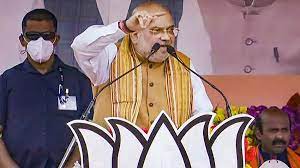Sovereign promises of the government are not absolute and a law or scheme of Parliament can be reviewed by the courts of law and struck down if they violate fundamental rights, according to senior advocate and constitutional expert, Rakesh Dwivedi has said.
Speaking to Moneycontrol about the electoral bonds judgement, Dwivedi said, “Under our Constitution, whenever Parliament makes a law, it is well known and well settled that it is subject to judicial review. The constitutional courts are entitled to test that law on the basis of fundamental rights and constitutional provisions” .
An electoral bond is an instrument through which anyone can donate money to political parties. Such bonds were sold in multiples of Rs 1,000, Rs 10,000, Rs 1 lakh, Rs 10 lakh, and Rs 1 crore and can be bought from authorised branches of the State Bank of India (SBI), providing anonymity to the donors. These bonds were introduced in 2017 to bring transparency in electoral funding and the scheme was formally launched in 2018.
On February 15, a five-judge bench of the Supreme Court (SC) unanimously struck down the electoral bonds scheme. The court also directed the State Bank of India (SBI) and the Election Commission of India (ECI) to reveal the list of donors and the amount each political party redeemed.
While the judgement has been largely hailed as it upheld the right of the citizens to information about political funding, a section of people opined that it struck down a sovereign promise of providing anonymity to donors.
“When we act on the strength of a law, then we know that this law will have to stand this test in the court if challenged,” Dwivedi said. The senior advocate noted that courts are conscious of the consequences that will follow when a law is struck down. However, they have the competence to strike down a law if they find that it is in violation of a fundamental right or a constitutional principle.
Read More: Mumbai Overtakes Beijing to Become Asia’s Billionaire Capital: Hurun Report
He said, “So in that sense, sovereign promise disappears when a law is struck down, and the consequences follow.” According to Dwivedi, the court had to balance the right to privacy of the donors and the right to information of the Indian public in general and it gave primacy to the right to information as it pertained to the democracy of the country.
“I don’t think the privacy of the person donating money to political parties prevails in these circumstances. Democracy weighs heavier than that,” he said.
‘Neither here nor there’:
Dwivedi said, “We note that everybody (Political parties) have got sizeable amounts of money through electoral bonds. All of them have some government or the other running correctly. All of them have police powers and powers to give benefits.”
The senior advocate noted that people of India were aware from 1947 that political parties in the country get donations from industries operated by private persons and it is not a surprising revelation. He said, “This search and who paid and what was paid is neither here nor there.” According to Dwivedi, political funding by industries cannot be curtailed or prevented by striking down the scheme.
“Now more money will flow and obviously in favour of the parties who are in power,” he said.
SC could have retained the scheme by making it transparent
As a personal opinion, Dwivedi noted that the apex court could have just struck the aspect of anonymity in the electoral bonds scheme and retained the other aspects of it. He noted that had the scheme been made transparent, the public would know the rationale behind government schemes and decipher whether a scheme was ‘quid pro quo’ (exchange of mutual benefits) or made in genuine public interest.
Read More: Indian talent key to Global capability centres product roadmap
He said, “If transparency was the issue the law could have been upheld with transparency; as a result of striking down, money will flow (into political parties) in any event, whatever you may do. It is globally known that big money plays its role.”



































